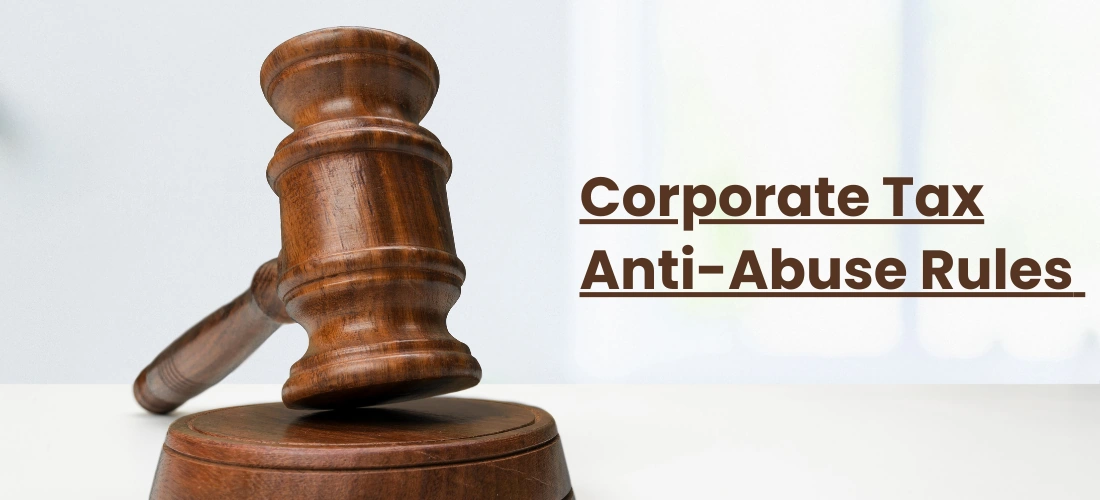
Corporate Tax Anti-Abuse Rules in UAE
(In the UAE, anti-abuse rule that specify when a transaction qualifies as tax-abusive are outlined in Article 50 of the tax legislation. Let’s talk about some key provisions of the tax code.)
What is Tax Abuse?
a) The employment of unlawful methods to lower the amount of taxes owed, avoid paying them, or get a tax refund that an individual is not legally entitled to receive is known as tax evasion.
b) It was obtained by unethical, fraudulent, or unlawful means, making it liable. Consequently, to put it simply, tax avoidance is forbidden. It is a willful disregard for the law regarding taxes.
c) Inaccurate tax records and inflated expenses are also included; understating revenue can result in fines and legal action.
Corporate Tax Abuse (PROTECTION AGAINST ABUSE)
This pertains to a deal or agreement if it is reasonable to conclude, in light of all the facts, that:
a) There is no legitimate business or other non-fiscal basis that takes into account the realities of the economy for the transaction, arrangement, or any portion of it to be entered into or carried out.
b) Obtaining a corporate tax advantage that is incompatible with the intention or goal of this Decree-Law is the primary goal, or one of the primary goals of the transaction, arrangement, or any portion of it.
Executive Tax Benefits
The following are only a few examples of benefits that come with corporate taxes:
a) A corporate tax refund, or a larger refund.
b) Reduction or avoidance of the corporate tax liability.
c) Postponing paying corporate taxes or advancing a refund of corporate taxes.
d) Ignoring the need to account for or deduct corporate tax.
The Authority may decide that it is necessary to offset or modify one or more specific corporate tax benefits that were acquired as a result of the transaction or arrangement. In the event of a determination, the Authority is required to release an assessment that implements the decision. This could consist of:
a) deciding whether to accept or reject any exemption, deduction, or relief when figuring out how much corporate tax is owed or how much taxable income there is.
b) Distributing to any other Persons any portion of any such exemption, deduction, or relief.
c) altering the nature of any payment, other sum, or portion thereof for the purposes of this Decree-Law.
d) ignoring the outcome that would otherwise come from putting other Decree-Law provisions into practice.
and has the authority to amend any other person’s corporate tax burden that is impacted by the Authority’s decision in a compensatory manner.
Application of the Anti-Abuse Rules
The following factors need to be taken into account when evaluating whether this Article 50 applies to a transaction or arrangement:
a) The manner in which the agreement or transaction was made or executed.
b) The nature and structure of the agreement or transaction.
c) When the arrangement or transaction is made.
d) The outcome of the deal or arrangement with regard to how this decree-law is applied.
e) Any alteration to the Taxable Person’s financial situation that has arisen from the transaction or arrangement, is anticipated to arise from it, or both.
f) Any alteration to another Person’s financial situation that has arisen from the transaction or arrangement, is anticipated to arise from it, or is reasonably expected to arise.
g) If, with regard to the relevant transaction or arrangement, the transaction or arrangement has generated rights or responsibilities that would not typically be created between Persons dealing with each other at arm’s length.
h) Any additional pertinent details or conditions.
Form of Whistle-blowing
a) Whistle-blowing is a novel method for gathering information about individuals or entities that are dodging taxes, committing fraud, or committing other tax offenses. When specific requirements are completed, whistleblowers can get a monetary incentive.
b)The whistleblower program raises community awareness of the need to disclose tax anomalies and comply with tax laws.
c)The program’s primary goal is to treat companies that violate tax laws more fairly by pursuing legal action against them or by imposing penalties.
